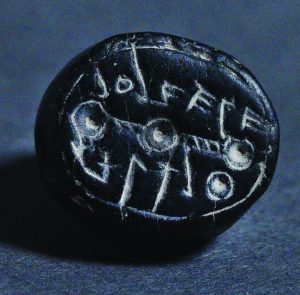×


We have detected your country as:
Please click here to go to the USA website or select another country from the dropdown list.

Seal bearing the inscription: “to Elihana bat Gael”
A rare 2,500-year-old seal bearing the name of a woman, “Elihana bat Gael” was discovered in the excavations at the Giv’ati parking lot at the City of David in Jerusalem. According to the excavation directors, “The owner of the seal was exceptional compared to other women of the First Temple period: she had legal status which allowed her to conduct business and possess property.” Another seal belonging to a man named “Sa’aryahu ben Shabenyahu” was found nearby.
Who were Elihana bat Gael and Sa’aryahu ben Shabenyahu? “Finding seals that bear names from the time of the First Temple is hardly a commonplace occurrence, and finding a seal that belonged to a woman is an even rarer phenomenon,” said the researchers.
After nine years of excavation, archaeologists at the Giv’ati site reached the strata of ancient Jerusalem dating to the First Temple period where a surprise awaited them: they found the two seals inside a structure built of magnificent ashlars believed to be an administrative center.
According to IAA [Israel Antiquities Authority] archaeologists, “Personal seals, such as those of Elihana and Sa’aryahu, were used for signing documents, and were frequently inlaid as part of a ring that was worn by the owner. In antiquity they designated the identity, genealogy and status of the owner of the seal.” On the rare woman’s seal, made of semi-precious stone, appears the mirror-writing of “to Elihana bat Gael,” inscribed in ancient Hebrew letters. The female owner of the ring is mentioned here together with the name of her father.
According to Dr. Hagai Misgav of Hebrew University, “Seals that belonged to women represent just a very small proportion of all the seals that have been discovered to date. This is because of the generally inferior economic status of women. Indeed, the name Elihana does not appear in the Bible, and there is no other information regarding the identity of the woman, but the fact that she possessed a seal demonstrates her high social status.
Most of the women’s seals that are known to us bear the name of the father rather than that of the husband. It seems that Elihana maintained her right to property and financial independence even after her marriage and therefore her father’s name was retained; however, we do not have sufficient information about the law in Judah during this period.”
The name Eliha is known from a contemporary Ammonite seal and is the feminine form of the name Eli, known from the Bible. The script appearing on the seal is remarkably similar to the script on Ammonite seals, and this might indicate the foreign origin of the artisan who carved the seal and possibly the foreign origin of Elihana, who apparently came from east of the Jordan River.”
The second seal that was exposed in the excavation was also in mirror-writing and bears the inscription “to Sa’aryahu ben Shabenyahu.” The name Sa’aryahu appears on a sherd from Arad, and apparently means “the Lord, which was revealed in a storm” (see Job 38).
Source: Excerpts from press release, Israel Antiquities Authority
All logos and trademarks in this site are property of their respective owner. All other materials are property of Bridges for Peace. Copyright © 2024.
Website Site Design by J-Town Internet Services Ltd. - Based in Jerusalem and Serving the World.